Patents
Japanese Typewriters
The first Japanese typewriter was invented in 1915 by Kyota Sugimoto. By the 1920s these typewriters had begun to be used by Japanese businesses. The San Jose history blog gives a description of how they worked:The paper cylinder and typing mechanism are on ball-bearing rollers, forming a very complex mechanical marvel. Using a Bakelite knob, the operator can move this mechanism left to right or up and down above the type-nest and position the striker over the selected character. Pressing down on the knob causes a pin under the type-nest to push up the selected type block, which is grasped by the striker from above. The striker rotates the type block 90 degrees over a small ink wheel and then strikes the paper. The striker then returns to its original position, dropping the type block back into the type-nest.
The Gatunka blog notes, "The beginning of the end for Kanji typewriters was heralded by the arrival of affordable digital word processors in 1984. By the mid 90s, personal computers also began to become popular in Japanese homes, and the age of kanji typewriters came to an end."

The Whitewright Sun - June 14, 1928

source: Wikimedia Commons

source: Wikimedia Commons
Posted By: Alex - Sun Jan 15, 2017 -
Comments (6)
Category: Inventions, Patents
Pidgin’s Visible Speech System
In 1917, Charles F. Pidgin received a patent for an invention to allow "visible speech" to be added to (silent) motion pictures by means of "inflatable balloons being shown for carrying the words and for enabling them to be blown from the mouth of the characters."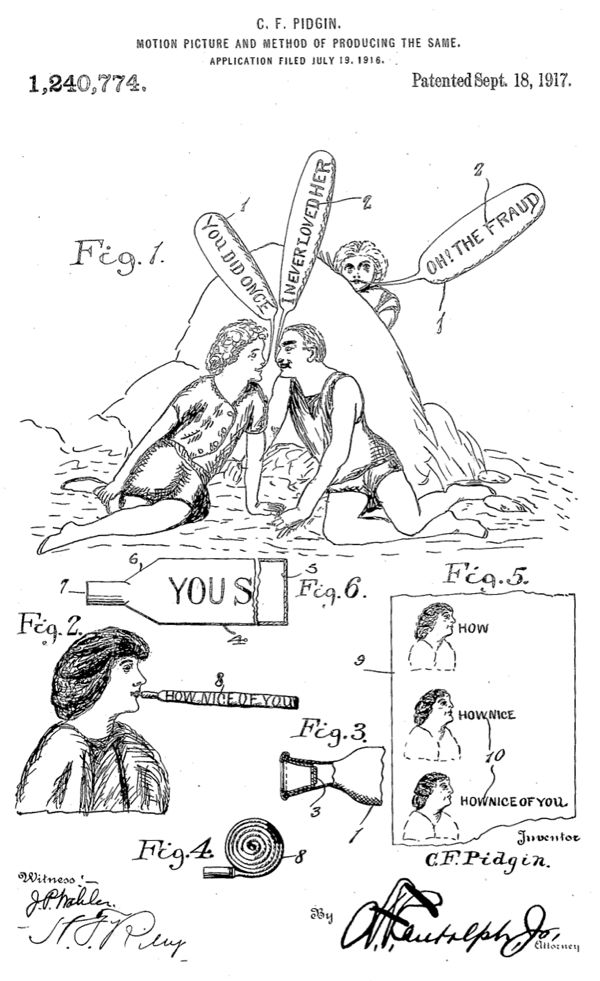
From his patent application:
Any form or shape of balloon may be employed for this purpose and a series of pictures or exposures may be taken during the inflation of the balloons, which may be successively or simultaneously inflated according to the requirements of the photo-play or other motion picture production. The blowing or inflation of the devices by the various characters of a photo-play will add to the realism of the picture by the words appearing to come from the mouth of the players.
I don't believe that Pidgin's visible speech system was ever used in a film. After all, critics ridiculed it even in 1917. From the New Castle Herald (Dec 1, 1917):
According to his obituary, Pidgin (1844-1923) was also a merchant, statistical expert, inventor of tabulating machines, and a noted historical novelist. More info: wikipedia.
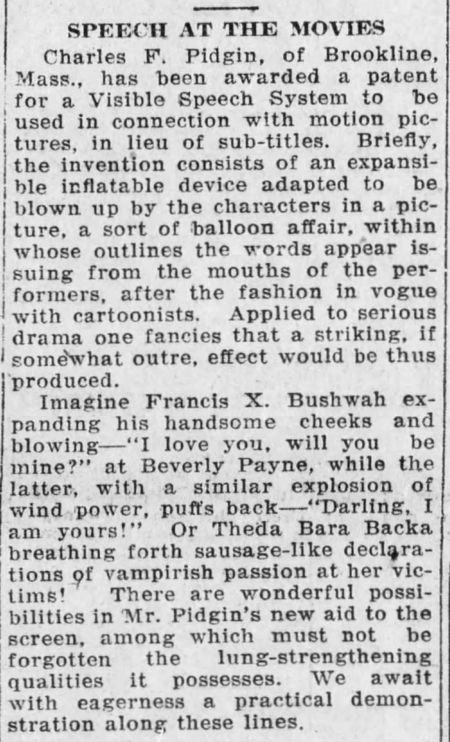
New Castle Herald - Dec 1, 1917
Posted By: Alex - Sat Nov 19, 2016 -
Comments (3)
Category: Patents
Tornado-Proof House With Tail
The idea, from an 1890 patent, was to make the house aerodynamic (long and narrow) and then attach it to a turntable, so that it could turn to face the wind.I'm sure there must be some basic flaw in the concept. I imagine the entire house being spun like a top by the wind.
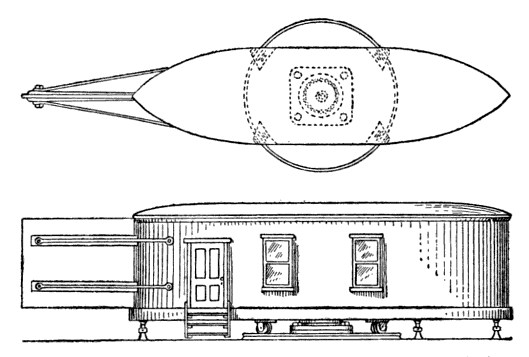
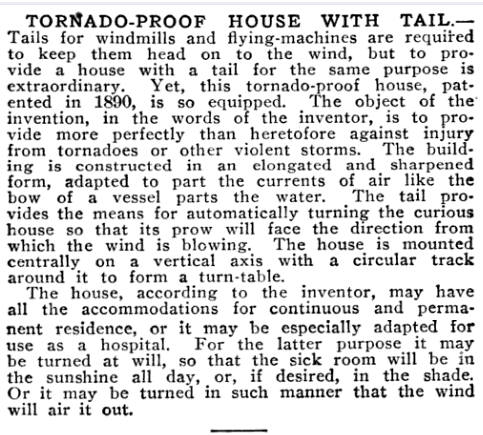
Source: Popular Mechanics - Apr 1910
Posted By: Alex - Wed Nov 04, 2015 -
Comments (19)
Category: Inventions, Patents, Nineteenth Century
Toilet Sanitary Shield For Men
Florida inventor Vladimir Laurent recently received a patent for a device which he describes as a "toilet sanitary shield for male genitalia." From his patent application:Laurent told the South Florida Business Journal, "It's a home product and it's designed for a specific need, for something that I felt was needed, personally." He also said that he's spent "between $25,000 and $30,000" on developing the product.
His patent included a line drawing (below) which illustrates his device being used. I've put a purple circle over the male dangly bit, in order to avoid any risk of offending that company which pays our web hosting bill (because that company is easily offended). You can see the unaltered patent image at the South Florida Biz Journal link above.
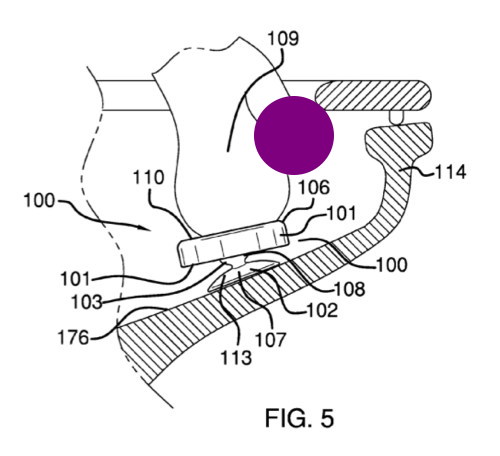
Posted By: Alex - Mon Oct 05, 2015 -
Comments (13)
Category: Bathrooms, Inventions, Patents, Genitals
MacLevy Leg Massager

Image source: Time magazine - April 19, 1948
Displayed at a Beauty Shop trade convention in Manhattan's Grand Central Palace, April 1948.
The machine (the MacLevy Leg Massager) was marketed to beauty shop owners. The introduction of home permanent wave kits in the mid-1940s had caused a steep decline in business for beauty shops, so the inventors of machines such as the leg massager were promising the shop owners that they could lure customers back by installing gadgets such as this, which would allow them to offer new services without having to hire trained masseuses.
The leg massager was invented by Monte MacLevy, who filed a patent application for it in July 1939. From the patent:

Posted By: Alex - Mon Sep 21, 2015 -
Comments (6)
Category: Inventions, Patents, 1940s
Hiccupops

Posted By: Alex - Fri Mar 20, 2015 -
Comments (2)
Category: Inventions, Patents, Medicine
Yoga Patent
A company called YogaGlo recently received a patent for the concept of an "image capturing device" placed in "a studio having a front area and a rear area" and containing an instructor and a "plurality of students." Which is to say, they've patented the idea of filming a yoga class.The Washington Post credits the reward of this patent to the "culture of the patent office," which views "more patenting as a good thing" and doesn't like to reject patents lest examiners get "bogged down in never-ending arguments with applicants."

Posted By: Alex - Sat Dec 14, 2013 -
Comments (4)
Category: Inventions, Patents
Global Warming Solved
Nike recently filed a patent application for "a golf ball that includes carbon dioxide absorbents in order that the golf ball may reduce atmospheric carbon dioxide levels to aid in alleviating global warming."So if we all just play more golf, that global warming thing should be reversed in no time! [via Mother Jones]

Posted By: Alex - Sat Nov 09, 2013 -
Comments (7)
Category: Inventions, Patents, Sports
The Fire Escape Parachute
Patented by Benjamin Oppenheimer in 1879. I wonder if he ever tried testing it.
The accompanying drawing represents a side view of a person with my improved fire escape or safety device, by which a person may safely jump out of the window of a burning building from any height; and land, without injury and without the least damage, on the ground; and it consists of a parachute attached, in suitable manner, to the upper part of the body, in combination with overshoes having elastic bottom pads of suitable thickness to take up the concussion with the ground.
Posted By: Alex - Sun Sep 22, 2013 -
Comments (7)
Category: Inventions, Patents, Nineteenth Century
The Scream Muffler
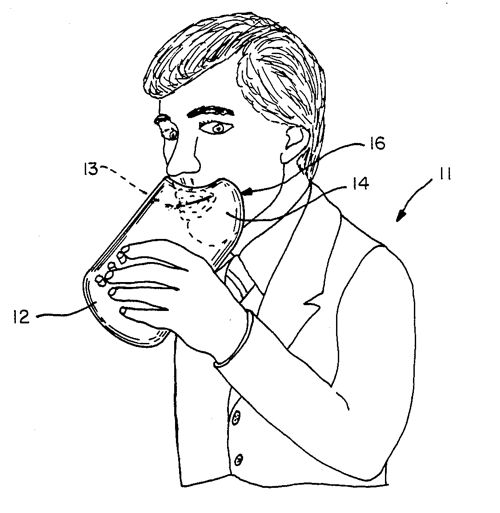
Patent No. 4834212, issued on May 30, 1989 to inventors Moira and Frank Figone.:
It is a general object of the present invention to provide a sound muffler which can be placed over the mouth to receive and muffle sound from the mouth. It is a further object of the present invention to provide a sound muffler which provides means for measuring and indicating the intensity of the sound which is muffled.
But there seems to be a prior art issue here, because I did a news search and found a story about a woman, Diane Berkowitz, who was selling a scream muffler in 1987 described as a "silver-colored sphere which opens to reveal some sort of sound-absorbent acoustic foam."
Perhaps the Figones were able to claim their device was unique because Berkowitz didn't add blinking lights to indicate the scream intensity.
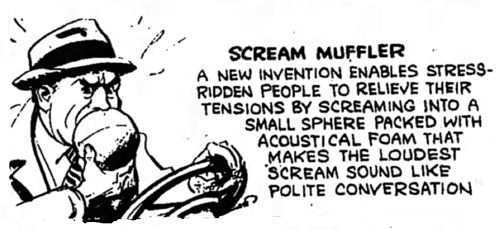
Ripley's Believe It or Not - Mar 5, 1987
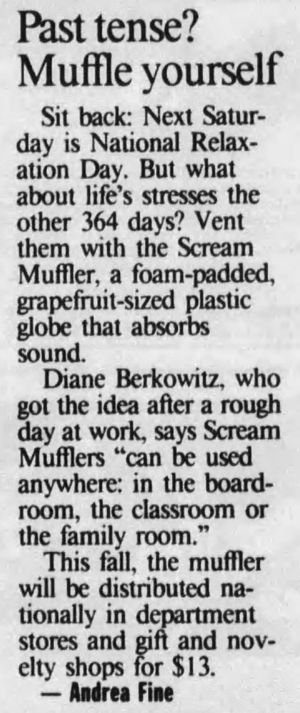
The White Plains Journal News - Aug 7, 1987
Posted By: Alex - Fri May 22, 2009 -
Comments (1)
Category: Inventions, Patents

| Who We Are |
|---|
| Alex Boese Alex is the creator and curator of the Museum of Hoaxes. He's also the author of various weird, non-fiction, science-themed books such as Elephants on Acid and Psychedelic Apes. Paul Di Filippo Paul has been paid to put weird ideas into fictional form for over thirty years, in his career as a noted science fiction writer. He has recently begun blogging on many curious topics with three fellow writers at The Inferior 4+1. Contact Us |




